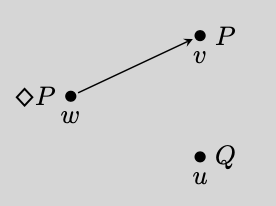Accessibility relation on:
[Wikipedia]
[Google]
[Amazon]
 An accessibility relation is a
An accessibility relation is a
Logique et Analyse
No. 117–118, pp. 69–79, 1987. * Fitelson, Brandon; ''Notes on "Accessibility" and Modality'', 2003. * Brown, Curtis; ''Propositional Modal Logic: A Few First Steps'', 2002. * Kripke, Saul; ''Naming and Necessity'', Oxford, 1980. * *
List of most of the more popular modal logics. {{DEFAULTSORT:Accessibility Relation Modal logic Binary relations
 An accessibility relation is a
An accessibility relation is a relation
Relation or relations may refer to:
General uses
*International relations, the study of interconnection of politics, economics, and law on a global level
*Interpersonal relationship, association or acquaintance between two or more people
*Public ...
which plays a key role in assigning truth values to sentences in the relational semantics for modal logic
Modal logic is a collection of formal systems developed to represent statements about necessity and possibility. It plays a major role in philosophy of language, epistemology, metaphysics, and natural language semantics. Modal logics extend other ...
. In relational semantics, a modal formula's truth value at a ''possible world
A possible world is a complete and consistent way the world is or could have been. Possible worlds are widely used as a formal device in logic, philosophy, and linguistics in order to provide a semantics for intensional logic, intensional and mod ...
'' can depend on what's true at another possible world , but only if the accessibility relation relates to . For instance, if holds at some world such that , the formula will be true at . The fact is crucial. If did not relate to , then would be false at unless also held at some other world such that .
Accessibility relations are motivated conceptually by the fact that natural language
In neuropsychology, linguistics, and philosophy of language, a natural language or ordinary language is any language that has evolved naturally in humans through use and repetition without conscious planning or premeditation. Natural languages ...
modal statements depend on some, but not all alternative scenarios. For instance, the sentence "It might be raining" is not generally judged true simply because one can imagine a scenario where it was raining. Rather, its truth depends on whether such a scenario is ruled out by available information. This fact can be formalized in modal logic by choosing an accessibility relation such that iff is compatible with the information that's available to the speaker in .
This idea can be extended to different applications of modal logic. In epistemology, one can use an epistemic notion of accessibility where for an individual iff does not know something which would rule out the hypothesis that . In deontic modal logic, one can say that iff is a morally ideal world given the moral standards of . In application of modal logic to computer science, the so-called possible worlds can be understood as representing possible states and the accessibility relation can be understood as a program. Then iff running the program can transition the computer from state to state .
Different applications of modal logic can suggest different restrictions on admissible accessibility relations, which can in turn lead to different validities. The mathematical study of how validities are tied to conditions on accessibility relations is known as ''modal correspondence theory''.
See also
*Modal logic
Modal logic is a collection of formal systems developed to represent statements about necessity and possibility. It plays a major role in philosophy of language, epistemology, metaphysics, and natural language semantics. Modal logics extend other ...
* Possible worlds Possible Worlds may refer to:
* Possible worlds, concept in philosophy
* ''Possible Worlds'' (play), 1990 play by John Mighton
** ''Possible Worlds'' (film), 2000 film by Robert Lepage, based on the play
* Possible Worlds (studio)
* ''Possible Wo ...
* Propositional attitude
A propositional attitude is a mental state held by an agent toward a proposition.
Linguistically, propositional attitudes are denoted by a verb (e.g. "believed") governing an embedded "that" clause, for example, 'Sally believed that she had won ...
* Modal depth
References
* Gerla, G.; ''Transformational semantics for first order logic''Logique et Analyse
No. 117–118, pp. 69–79, 1987. * Fitelson, Brandon; ''Notes on "Accessibility" and Modality'', 2003. * Brown, Curtis; ''Propositional Modal Logic: A Few First Steps'', 2002. * Kripke, Saul; ''Naming and Necessity'', Oxford, 1980. * *
List of most of the more popular modal logics. {{DEFAULTSORT:Accessibility Relation Modal logic Binary relations